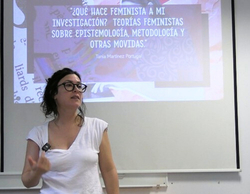
The social mission of the public university in dispute
The Exploratory Diagnosis on Critical University Extension in 8 universities reveals that we are confronting a process of weakening of the social mission of the public university which is closely related to the erasure of the university extension as the third mission of the university.
Juanjo Celorio and Iris Murillo, both members of Hegoa's Education Team, presented some of the results of the Diagnosis at the 1st Critical University Extension Conference, held on 23 and 24 May 2024 at the University of Granada (UGR). This event is part of the Critical University Extension project, promoted by Hegoa and financed by the Spanish Agency for International Development Cooperation (AECID, according to the initials in Spanish).
The Diagnosis, which will be published at the end of 2024, analyses the university extension in Spain. At the same time, in coordination with several Latin American universities, the study aims to create a theoretical framework for a Critical University Extension (ExUC), in order to deepen into the meaning of this university function. All based in collaboration between universities from the Global North and the Global South.
The Diagnosis has been made out of the analysis of secondary sources (statutes, strategic plans, etc.) and primary sources (including in-depth interviews with representatives of the universities' governing bodies and online questionnaires with agents from the 8 university communities). According to the information gathered, "We can glimpse a political intention to erase the third mission of the university, which implies a separation from the objective for which the extension was created".
The recently approved law regulating the university system (LOSU in Spanish) reflects this statement. This new law, unlike its predecessor, no longer refers to university extension and, as stated by one of the people interviewed: "we are talking about a historical reference in all Spanish democratic university legislation that no longer exists".
This reduction is palpable in the documents that gather the universities’ regulations and policies. When comparing the prevalence of the concept in the strategic statutes and plans, a significant reduction of its usage is noticeable, especially in the current university policies guiding documents.
Following the tendency of the new law (LOSU), there is a significant increase in the concept of "Transfer" (or "knowledge transfer") to describe the relationship between the University and the public sector. This term is by far the most used concept in terms of quantity and diversity (it is the only one used in all the strategic plans analysed in the Diagnosis).
However, the political proposal of "transfer" and "university extension" differ considerably. “Transfer” aims to project the knowledge generated in and by the University to society. To this end, as stated in the LOSU itself, it positions the University as the "main producer and disseminator of knowledge". In contrast, university extension proposes a dialogical relationship between the University and Society, where both can recognise each other as producers of knowledge and can work together to overcome the challenges of today's society.
Click here to read the full article.
More information:
-
Chronicle of the 1st Conference: "Agents from 17 universities meet in Granada to rethink, from a critical point of view, the university extension function".
-
Declaración final de las I Jornadas de Extensión Universitaria Crítica (in Spanish).
Related news




